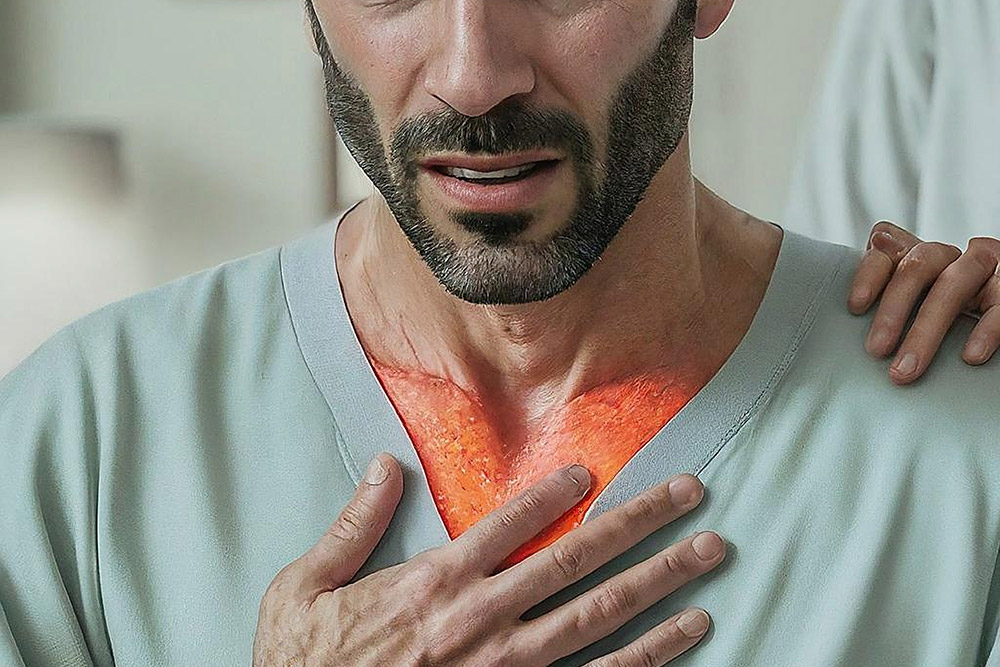What Is Acid Reflux?
Acid reflux occurs when stomach acid backs up into the esophagus, causing irritation and the classic burning sensation in the chest or throat often called heartburn. When this happens more than twice a week or causes complications, it may be diagnosed as GERD (gastroesophageal reflux disease).
Common Causes and Risk Factors
- Eating spicy, fried, fatty or acidic foods
- Overeating or eating large meals
- Obesity or rapid weight gain
- Hiatal hernia (stomach pushes up through the diaphragm)
- Smoking or excessive alcohol use
- Certain medications (e.g., NSAIDs, some blood pressure drugs)
- Pregnancy-related hormonal changes
- Lying down soon after eating
Signs and Symptoms
- Burning sensation in the chest (heartburn) or throat
- Sour or bitter taste in the mouth
- Regurgitation of food or liquid
- Chronic cough, hoarseness, or throat clearing
- Difficulty or pain when swallowing
- Bloating, burping, or feeling full quickly
- Worsening symptoms when lying down or bending over
How Dr. Rishi Diagnoses Acid Reflux?
Dr. Rishi uses a step-by-step approach:
Medical History and Exam
He reviews your diet, weight changes, lifestyle habits and discusses your symptoms in detail.
Upper Endoscopy
A thin, flexible camera inspects the lining of your esophagus and stomach for inflammation or damage.
pH Monitoring
A tiny probe records acid exposure in your esophagus over a 24-hour period to confirm reflux events.
Esophageal Manometry
This test measures the strength and coordination of esophageal muscle contractions during swallowing.
Medical Coding
Once confirmed, your condition is coded under ICD-10 as K21.9 for accurate documentation and treatment planning.
Frequently Asked Questions
What does acid reflux feel like?
A burning sensation in the chest or throat, often after eating or when lying down.
When should I see a specialist?
If you experience heartburn more than twice a week, it wakes you up at night, or over-the-counter treatments don't help.
Can over-the-counter medications help?
Yes. Antacids and H2 blockers are effective for occasional or mild symptoms.
Are there risks with long-term PPI use?
Proton pump inhibitors can reduce absorption of calcium and magnesium and may increase fracture risk over time. Your doctor will monitor you.
What's the ICD-10 code for acid reflux?
Code K21.9 for gastroesophageal reflux disease without esophagitis; K21.0 if esophagitis is present.
What foods should I avoid?
Spicy foods, chocolate, mint, citrus fruits, tomatoes, caffeine, alcohol, and fried or fatty items.
How long do reflux symptoms last?
A mild episode may last a few minutes. Chronic reflux can persist for months or years without treatment.
Can reflux feel like a heart attack?
Yes. Severe chest pain from reflux can mimic a heart attack. Always rule out cardiac causes first.
Will weight loss help reduce symptoms?
Yes. Losing 5-10% of your body weight often lessens pressure on the stomach and improves reflux.
When is surgery an option?
Surgery or endoscopic procedures are considered if medications and lifestyle changes fail or if you prefer a drug-free solution.











